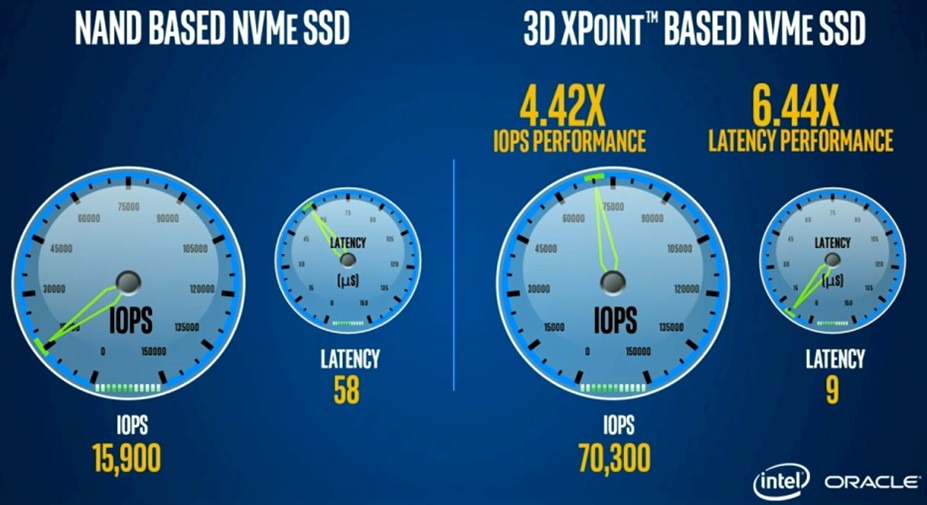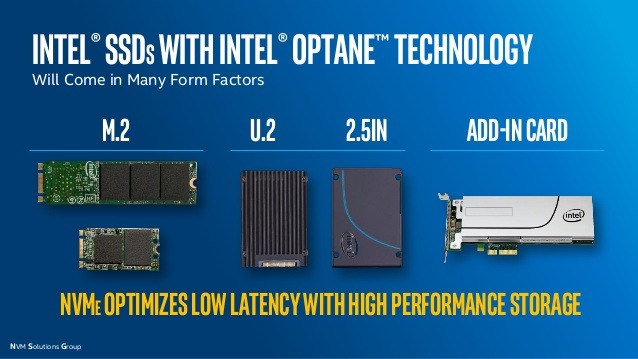A new ultra-fast memory technology from Intel and Micron branded as Optane is expected to launch in 2017, and could pave the way for even faster storage on Apple's MacBooks.
Optane is compatible with the NVMe storage protocol that Apple already uses in some of its MacBooks, as noted by Macworld. That means it could be relatively easy for Apple to transition and take advantage of the new technology.
Using 3D Xpoint technology, Optane is said to offer speeds 1,000 times faster and more durable than common flash storage. That's because it's 10 times denser than DRAM.
Apple launched Non-Volatile Memory Express support in its new 12-inch MacBook, and enabled it with a software update to OS X last April.
NVMe is meant to replace aging AHCI technology, which was designed to maximize performance in systems using spinning hard drives. NVMe is optimized for lower latency operations afforded by solid state media, or non-volatile memory.
Compared to AHCI, NVMe reduces latency by 50 percent. For example, Intel puts latency overhead in SCSI/SAS systems at 6 nanoseconds at 19,500 cycles, but quotes NVMe at 2.8 nanoseconds at 9,100 cycles (PDF link).
Further, NVMe is designed to scale over the next decade, a lifecycle comparable to AHCI, which was introduced in 2004. And since Apple has been using the PCIe transport protocol since 2011, the company is in a good position to expeditiously roll out support across the entire Mac lineup.
 Katie Marsal
Katie Marsal









 Charles Martin
Charles Martin
 Christine McKee
Christine McKee
 Wesley Hilliard
Wesley Hilliard
 Malcolm Owen
Malcolm Owen
 Andrew Orr
Andrew Orr
 William Gallagher
William Gallagher
 Sponsored Content
Sponsored Content








47 Comments
Does the 'data bus' speeds come into play here? Or said another way(not too clear to me in article) what does this translate to in real life usage?
[Ludicrous Speed! https://www.youtube.com/watch?v=ygE01sOhzz0]
1000x is misleading. Random accesses to bytes distributed far and wide across the memory array will be much faster, as there is no Flash page load latency. But sequential accesses, which are far more common, will go no faster than the processor's memory interface. The real-life speed improvement will be far less than 1000x, and probably far less than 10x (as already shown in the chart).
We've got half a century of computer system design (both hardware and software) wrapped around the idea of large scale high speed sequential storage. The arrival of large scale high speed random storage doesn't change all of that. It'll take time for CPU designers to adapt cache strategies (or even eliminate cache), and for OS and app designers to adapt algorithms to take advantage of this new technology.
With mass production "12-18 months away" (http://www.eetimes.com/document.asp?doc_id=1328682), Optane won't be appearing on
any near-term Mac refresh.
Someone, please in layman's engish: what speed would a MacBook Air's hard drive get with one of these drives in the real world? Anytime I ever hear of something that will be 1000x faster I reach for the salt.
The most significant upgrade to HHD based computers is a simple HHD / SSD swap. If this increases the speed still further that is only positive though the headline is ridiculously misleading. If my next computer was a 1000 times faster than the one I have now they'd have to build in obsolescence somewhere else. The damn thing would be good for a decade at least.